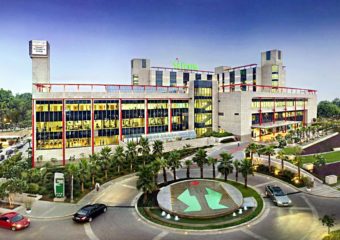High-Quality Best Radical Cystectomy Cost In India
How Much Does Radical Cystectomy Cost In India?
Many potential patients for surgery are a concern to know about Radical cystectomy Cost in India? The average cost of Radical cystectomy in India usually starts $7,000 however, it may go up to as much as $15,000. it depends on the hospital charges and the fee charged by the surgeon. Additional costs also include in the packages Like:- the diagnostics before the surgery and pre-operational consultations

What is a Radical cystectomy?
A radical cystectomy is a surgical procedure to remove the bladder. Radical Cystectomy, also known as total Cystectomy is surgical is the removal of the entire bladder, nearby lymph nodes (lymphadenectomy), part of the urethra, and nearby organs that may have been invaded by the cancer cells. Radical cystectomy is the removal of the entire bladder and surrounding tissues that may contain cancer cells.
In men, radical cystectomy generally includes removal of the urinary bladder, prostate and seminal vesicles as well as lymph glands that may hold little stores of malignant growth cancer cells. At times it might be important to remove the entire of the urethra (water pipe) also.
In female, it usually includes removal of the urinary bladder, the entire of the urethra, some portion of the vaginal wall, the ovaries, the belly and the lymph nodes – for some ladies, the vagina and conceptive organs can be saved.
The extent of surgery is tailored to individual patients and procedures such as nerve sparing to improve sexual function can be considered.
Partial cystectomy is the removal of part of the bladder and is performed in patients with a specific type of cancer which makes up less than 5% of all cases.
Why should I have a Radical cystectomy?
The benefits of this operation will be discussed with you in more detail, but your doctor may be recommending surgery for you because:
- Patient has cancer in his/her bladder which would be best managed by complete removal of the bladder by radical cystectomy.
- your bladder might be damaged at the time of radiation treatment
- your bladder might be bleeding after chemotherapy or radiotherapy
- your bladder might be damaged or bleeding uncontrollably from other causes or treatments.
Are there any alternatives?
- Possible alternative treatments will depend on the reason you are being recommended a radical cystectomy. However, examples include:
- having radiation therapy with or without chemotherapy, or other forms of cancer treatment if you have cancer
- choosing not to have treatment while recognising the risks of your condition.
What are the Benefits of a robotic radical cystectomy?
Robotic surgery’s miniaturization, increased range of motion, enhanced vision and mechanical precision offer significant benefits for radical cystectomy patients, including:
- Less blood loss
- Less risk of needing blood transfusions
- Less post-surgical pain and need for post-operative narcotics
- Quicker recovery and return to normal activities
- Less scarring
What are the risks of a radical cystectomy?
Your surgeon will discuss the possible risks of radical cystectomy with you in more detail before asking you to sign a consent form. Please ask questions if you are uncertain about anything.
Possible early complications of any major operation
Problems that can happen while you are in hospital recovering are similar to those for any major operation. These include:
- bleeding requiring the need for a blood transfusion or re-operation
- injury to nearby nerves or tissues
- a chest infection
- blood clots in your lower leg (deep vein thrombosis or DVT) which could pass to your lung
- wound infection
- bruising around your wound, poor wound healing or weakness at the wound site.
Specific risks for a Radical cystectomy include:
- Damage to your rectum requiring surgical repair and/or colostomy formation (additional temporary stoma for poo)
- leakage from, or narrowing of, your intestine where the section of the bowel was removed, which may need surgery
How you prepare
Before radcial cystectomy, talk with your primary care physician about the medicines you take and your use of caffeine, alcohol or other medications and supplement. You may need to make changes to your prescriptions or stay away from specific substances to help with healing and recovery after medical procedure.
If you smoke, the best thing you can do for your health is to quit before surgery. Not only is smoking a risk factor for developing bladder cancer, smoking also increases the risk of developing problems after surgery.
When you schedule your surgery, you’ll receive specific guidelines on how to prepare for the procedure. If you have any questions about the guidelines, follow up with your surgeon or other member of your health care team.
Your surgeon may recommend one of these approaches for your surgery:
Open surgery. This approach requires a single incision on your abdomen to access the pelvis and bladder.
Minimally invasive surgery. Your surgeon makes several small incisions on your abdomen where special surgical tools are inserted to access the abdominal cavity.
Robotic surgery. During this type of minimally invasive surgery, your surgeon sits at a console and remotely operates the surgical tools.
Radical cystectomy can be performed either by making a abdominal incision to access the organs (open surgery) or by minimally invasive (keyhole) surgery (laparoscopic or robotic surgery).
During Radical cystectomy
Laparoscopic surgery (also called keyhole surgery) is carried out using 5-6 small incisions (through which the instruments are inserted). These incisions are about 1cm long, compared to a single 15cm-18cm long incision for traditional open surgery. A camera is inserted through one of these cuts so as to see inside the belly. Gas (Carbon dioxide) is inflated into the stomach so as to make space to work.
Robotic surgery is a laparoscopic technique where the surgeon uses a robotic device (the daVinci system) to control the laparoscopic instruments. The surgeon sits on a comfort that is close to the patient and the instruments inside the patient replicate the movement of his hands.
The benefits of laparoscopic or robotic surgery over the open approach are not established but average blood loss is generally less compared to traditional open surgery and return to eating and moving around is often faster due to the smaller incisions.
Urinary Diversion
Once the bladder is removed a urinary diversion always accompanies radical cystectomy to replace the function of the bladder. When the bladder is removed during surgery, your surgeon must recreate another route by which urine can be removed from the body. This usually involves using a section of your bowel to create an alternative method of storing and then expelling the urine.
The two common types of urinary diversion are Urostomy (ileal conduit) and neo-bladder (orthotopic continent diversion). A less common procedure including continent cutaneous diversion, ureterostomy or ureterosigmoidostomy, may be offered and discussed with you prior to the operation.
Recovery from Radical cystectomy
- A person is put under general anesthesia during surgery to remove the bladder. The person is likely to feel groggy from the anesthesia when waking up immediately following the surgery.
- Your surgeon will prescribe medications, such as narcotics or an epidural, to manage the pain.
- Commonly, when an individual’s condition settles, they will move from a post-operative space to a regular hospital room for about seven days. During this time, their care team will assess the new system for urine evacuation.
- The medical team will not release the person from the hospital until they are sure the new urine evacuation system functions correctly.
- In some cases, a person will have to undertake new steps to evacuate urine after they have had their bladder removed. When this happens, hospital staff will show both the individual and their parental figures how to evacuate the urine.
- After leaving the hospital, a person should expect to take several weeks for recovery. During this time, their body heals from the surgery, and they should only perform light activities.
- After 4 to 6 weeks, Surgeons will usually allow a person who has had their bladder removed to resume normal activities.
Frequently asked questions radical cystectomy
How long does radical cystectomy surgery take In India?
It usually takes 4 to 8 hours to complete this operation. On completion of the operation the surgeon will contact your family there.
A portion of your intestines will be used to create the urinary redirection. It is important that the whole intestine be clean before surgery, and that you prepare your gastrointestinal tract prior to admission to the hospital. Your surgeon will provide you specific guidelines for the bowel preparation.
What is the Main Function of the Bladder?
The urinary system, which involves the bladder, urethra, ureters, and kidneys, helps maintain stable chemical conditions in the body, stores and eliminates waste products. The bladder, a strong chamber situated in the lower midsection, goes about as a supply to gather Urine. Two thin tubes called ureters convey urine from the kidneys to the bladder. From the bladder, Urine is empted through another tube, the urethra, during urination.
Can you live without your bladder?
If you’ve had your bladder removed, you’ll need to get used to a new way to pass urine from your body. The operation you had, called a cystectomy, is a lifelong change.
Best Surgeons for bladder Removal In India?

Dr Vikram Sharma
Director , MBBS, MS 30 years of experience Gurgaon , India

Dr sanjay Gogoi
Director , DNB, MCh, MS, MBBS 20 Years of Experience New Delhi , India



